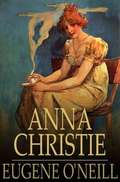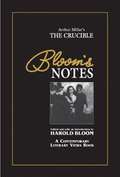- Table View
- List View
Hassan: The Story of Hassan of Baghdad and How He Came to Make the Golden Journey to Samarkand
by James Elroy FleckerNone.
Anna Christie
by Eugene O'NeillEarly in his career, Eugene O'Neill (1888-1953) wrote a series of plays revolving around characters obsessed with the sea. This period culminated in the 1922 production of Anna Christie, a drama of social realism that was among the first of the author's plays to explore characters searching for their own identities. Centering on the reunion of a barge captain and his daughter after a twenty-year separation, the play derives its tension from the former's disaffection for the seafaring life and the latter's love for a sailor. The father-daughter conflict elicits a shocking confession, which illuminates the author's contention that character is fate and the seemingly external forces controlling destiny actually lie within<P><P> .Anna Christie amply displays O'Neill's extraordinary insights into character and his masterly use of language, qualities that have earned him acclaim as one of America's greatest playwrights. Students and lovers of modern theater will prize this inexpensive edition of his landmark drama.<P> Pulitzer Prize Winner
Good Moon Rising
by Nancy GardenLambda Literary Award winner Good Moon Rising is about two young women who fall in love while rehearsing a school play, realize they're gay, and resist a homophobic campaign against them.
Renaissance Drama and the English Church Year
by Rudolph Chris Hassel Jr.Evidence encouraging a new and productive approach to Renaissance drama has long been available in the records of Renaissance court perfon-nances compiled by E. K. Chambers and Gerald Eades Bentley.' Over fifty years ago Chambers noticed the persistent correlation between the dates of dramatic performance at Elizabeth's court and certain liturgical festivals of the English church year. Whether in Whitehall or elsewhere, the twelve days of Christmas from the Nativity to the Epiphany, were a season of high revels.... Twelfth Night [6 Jan.] itself, with St. Stephen's [26 Dec.] , St. John's [27 Dec.], Innocents' [28 Dec.], and New Year's Day [circumcision], were regularly appointed for plays and masks, which often overflowed on to other nights during the period.... The revels were renewed for Candlemas [2 Feb.] and for Shrovetide [Sunday, Monday, and Tuesday before Ash Wednesday] , either at the Christmas headquarters or at some other palace to which the court had meanwhile removed. . . . Easter, with the distribution of alms and washing of feet on Maunday Thursday, and Whitsuntide, were kept as ecclesiastical, rather than secular feasts. [1: 19-201 Gradually emerging during the sixteenth century, this calendar tradition seems to have peaked in the period 1570-85, continued strong until Elizabeth's death, diminished and changed somewhat during the Jacobean and Caroline periods, and then disappeared completely after 1640.
The Plum Tree
by Mary Ellen ChaseThree old ladies are the central characters in this story which deals with a special day in their lives. It was the loving understanding of the matron and a nurse in the home for aged women that converted a potential nightmare into a gala occasion.


